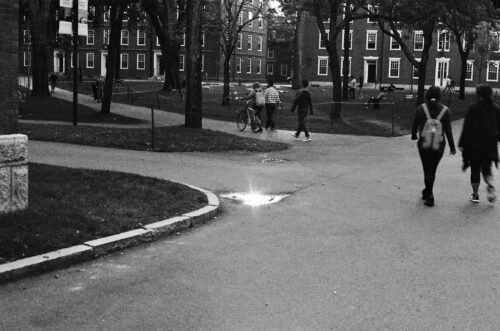And just like that, Zoom high school came to an end. The lucky undergraduate class of 2025 began our first of four years at Harvard with an introduction from Ivy Yard Dean Katie Denzon to the common phenomenon of impostor syndrome. Denzon spoke of the tendency for first-year students to characterize ourselves as “other,” believing we don’t belong here as much as our peers. Like many of my classmates, I prepared to be daunted by Harvard’s competitive stereotype. But my first impression of Harvard is that this isn’t quite the case.
In Annenberg, first-years convene and feelings of imposter syndrome subside. All are welcome; many students feel comfortable sitting down at a random table. I had visions before coming to Harvard of walking into the church-like hall with a lunch tray knowing no one and not having a place to sit. But in my first week, I found myself stuck in one heated debate about the possibilities of aliens and one discussion on the animal rights attached to fruit flies.
“We have a really interesting student body, but I think a lot of the interesting aspects about people you don’t get exposed to if you just randomly meet with them once or twice. Nobody wants to talk about their accomplishments, right?” said Tyler Heaton ’25. I find myself tempted to ask every random freshman the infamous question: “How did you get in?” But I prefer speculation. I enjoy simply observing intelligence as one of their main traits rather than their defining characteristic.
However, first-years are quick to see past the glory of Annenberg’s glass windows and start to grapple with the academic rigor before them. We knew the work would be hard, but didn’t know we’d have to work past midnight in the first few weeks. Avoiding the luxury of Lamont’s 24-hour availability is a goal that many have not achieved. Last night, I attempted and quickly failed to skim How to Build a Habitable Planet for my General Education requirement. Instead, I found myself procrastinating and staring at the stains of my late-night Jefe’s burrito from the night before.
For Julia Frietag ’25, problem sets are the leading hindrance for any free time. “While taking attendance, my teaching fellow in my [Life Science] section asked what fun thing we did during last week, and I didn’t have an answer. And none of us did. It was kind of an eye-opening experience. It was nice to know we are all in the same boat, good or bad,” Frietag said.
While I can relate to this predicament, I cherish the academic freedom that Harvard offers with over 3,700 courses from which to choose. The undergraduate workload depends heavily on students’ courses and their concentration, which they have until the end of their third semester at the College to declare. “I think academically I look forward to the choice, like the freedom. In the UK, you don’t have that; you have to pick one thing,” said Charlie McNamara ’25.
Despite the workload, first-years still desire to find student organizations that match their passions. Many of the 450 student organizations use the “comping” process to determine who is qualified to earn membership to their club.
For many of us, it took the joy out of trying out something new. “Comping is pretty overwhelming since I didn’t know what clubs I actually wanted to do,” said Freitag. “It felt like a lot of extra work for things I might not end up joining in the first place that I just wanted to try out.” Similarly, McNamara’s comping experiences have dissuaded her from applying to a few student organizations, due to their extensive application process and competitive selection committees.
“I feel like the comping process definitely challenges you to go out of your comfort zone,” said Alexandra Lenzo ’25. But she sees this as a good thing: “I think it’s important to embrace those challenges. And you learn a lot from these comping processes. And I think it’s a great opportunity.”
Despite the competitive nature of joining clubs, first-years’ are overwhelmingly interested in making friends. Before coming on campus, many freshmen connected with their future classmates over social media, exemplifying the phenomenon of ‘friend scheming’ in which friendships are formed entirely online. “I have been meeting all of the incredible people that ‘ve been kind of interacting with on social media, but haven’t met in person,” Anoushka Chander ’25 said. “I’m literally about to have dinner with someone that I met through social media. … So it’s cool, because you get to see people as they’re transitioning into college … but then actually get to be real-life friends with them.”
However, the friend-making process is a lot of trial and error. Without a big party scene, meeting people at Harvard can be difficult, and the conversations can remain superficial. Heaton said one of his greatest worries about his college experience is “not being able to make deep meaningful relationships. Everything feels very surface-level at this point.” Though it may be difficult to do so, many first-years evidently want to get to know each other rather than compete with each other.
Starting college pushes people beyond their comfort zones which often leads to monumental personal growth. “I do feel inspired by everyone around me, but also it is very intimidating at times,” said Lenzo. “I think it’s good to feel uncomfortable and to step into and embrace that feeling.”
Perhaps this discomfort is itself unifying. Though we come from every corner of the globe, our anticipation and trepidation are a powerful and unexpected commonality that we may not have known on the first day. If everyone feels a bit out of place, then aren’t we all exactly where we need to be?
Eliza Kimball ’25 (elizakimball@college.harvard.edu) accredits Milk Bar for her pre-study sugar highs.

